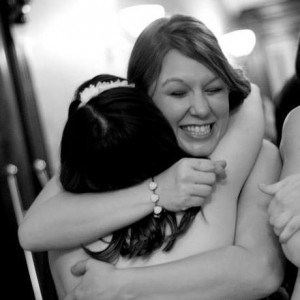The first time I thought about killing myself, I was five years old. I was rocking back and forth, holding myself and crying, while hiding underneath a pile of clothes on the floor of my closet. My sexual abuse started three years earlier, and would continue for another seven. The signs were all there: acting out, continual bladder or yeast infections, depression, anxiety, Irritable Bowel Syndrome, Poly Cystic Ovarian Syndrome, reoccurring nightmares, crying all the time. The adults in my life were so wrapped up in their own trauma, they failed to see what was happening right in front of them.
I grew up in an extremely religious environment. I didn’t know there was music outside the Christian genre until I was over twelve. If you were struggling, you just needed to pray harder. Mental illness was reserved for my schizophrenic aunt living on the streets of Portland, Oregon, and my bipolar uncle, who shot himself the day my aunt found out he was sexually abusing my cousin. That day, my mom sat me down to tell me the news., She finished by saying, “Don’t worry, it didn’t happen to you.” Those seven words silenced me for the next fifteen years.
All of my efforts during my teens and early twenties were directed at running away from my problems. I traveled to the most remote locations in the world under the guise of volunteering, when really I was trying to escape my pain. But the nightmares, the insecurities, the distorted thinking, followed me. I couldn’t leave myself behind. It took years before I believed myself, and could see past all the layers of shame and deceit. The suppressed pain and forced happiness stomped me flat. There were six months, I couldn’t leave the house. Years of believing suicide genuinely was the solution, but perceiving myself as being too weak to go through with it.
When I first decided to enter counseling during grad school, I thought “I will resolve this in the next six months.” That was the cutest and most naïve statement I ever made. Healing from trauma is a messy and broken process. It is composed of recovering and failing, quitting, and hitting rock bottom. Recovery is ugly crying in a lobby full of people while trying to access services, sobbing in front of countless health professionals, avoiding incredibly important tasks. It is picking fights with the people you love most and sabotaging your own efforts. It is learning to laugh at yourself as you start over again and again.
Recovery looks different for everyone. For me, it involved endless hours in therapy learning new coping strategies and how to love myself, acupuncture, craniosacral therapy, journaling, support groups, anti-depressants and anti-anxiety medications, and a litany of books on mindfulness, spirituality, and recovery. All of these self-care strategies add up to the long term goal of acceptance and peace – but I’m not there yet. My biggest hurdle now is unlearning. Unlearning the shame, the self-hatred, the fear, the doubt, the drinking, the version of love that included pain, and always reacting to life rather than engaging it. I slip up and make all kinds of mistakes on a regular basis, but no good can come from self-abuse and hatred. I can’t control everything in my life, but I can let go of the negativity and emotional baggage. I am not responsible for my abuse, but I am responsible for my words and actions now.
After I got married, I moved to Canada, which created physical distance from my family. With space, I could objectively see the actions of my immediate family members. Their inability to resolve their trauma allowed the cycle of abuse to continue. This cycle of intergenerational trauma, which plagued my family for generations, will end with me. I can’t guarantee nothing bad will happen to my kids, but I will do everything I can to listen to my kids, and be honest with them about the realities of life. I refuse to burden my future children with so much pain. I want my kids to grow up feeling safe, with physical dignity and unconditional love.
Some people will go their whole lives without breaking free of their shame or trauma, but it can be done. Recovery is inconvenient, and really really hard. It is living your authentic truth, and it’s hard fought for every day. Recovery is learning to hold polar-opposite truths simultaneously. Recovery is a thousand small steps in the right direction, regardless if you take three thousand in the wrong direction before or after. It is also the best gift you can ever give yourself. Start today.

Stacie is a 28-year-old Returned Peace Corps Volunteer (Togo, West Africa 2010-2012) with a Master’s Degree in Public Administration, and an overall awesome person. She is married to a ridiculously good-looking Canadian and has an adorable fur-baby named Rudy. She loves musical theater, swimming in the ocean, reading, and making friends with strangers.








Leave A Comment